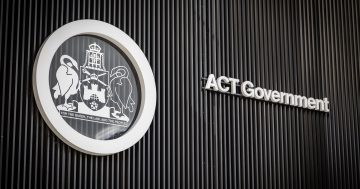
The ACT Government Public Service building in Civic. Photo: Michelle Kroll
ACT Government public servants are highly motivated and most are satisfied with their job, but they want more training, easier transfers to other agencies and are feeling the pressures of responding to multiple crises.
The feedback comes from the first whole-of-service employee survey linked to the annual State of the Service report out this week.
ACTPS Pilot Employee Survey indicates ACTPS employees have a high level of engagement with their work, with 82 per cent of respondents across the ACTPS reporting they are motivated and willing to go the extra mile to help their directorate achieve its objectives.
Across the service, 82 per cent of respondents reported believing strongly in the purpose and objectives of their organisation, and 75 per cent reported that they were proud to work there, and 76 per cent were satisfied overall with their current job and with the ACTPS as an employer.
But only 55 per cent of respondents reported they were satisfied with learning and development opportunities, and just 44 per cent reporting they were satisfied with the opportunity to temporarily transfer to other work areas within the ACTPS.
My Public Sector
A little more than half (58 per cent) indicated their career plan intentions for the next two years were to stay in their current directorate or organisation, 16 per cent indicated they plan to work elsewhere in the ACTPS, and 8 per cent reported they plan to leave the ACTPS to work elsewhere.
But there are indications that the challenges of the year have taken a toll. The most common employee response to the question ‘What are the most significant barriers to you performing at your best?’ was ‘Too many competing priorities’, with 35 per cent of respondents selecting this answer.
The report says that this may be due to the COVID-19 pandemic response and its rapidly changing priorities.
Feedback on supervisor performance was mainly positive, with 76 per cent of respondents ranking their supervisor highly, and team performance scored highly at 82 per cent.
But results for leadership were slightly lower, with a score of only 63 per cent for overall leadership.
The report said a review of executive leadership and leadership development in 2020 had found the approach to leadership development experienced by executives as fragmented and stop-start.
The review was, in part, sparked by the successive challenges the ACT had faced in 2019-20 including the bushfires, associated smoke haze and hazardous air quality, a massive hailstorm causing extensive local damage, and the initial wave of the COVID-19 pandemic.
It found “the challenge for executives is in collectively creating a culture to drive and sustain change, among competing demands, evolving priorities and limited resources”.
The Strategic Board backed the need for the ACTPS to introduce a more systematic, coherent and strategic approach to whole-of-ACT public sector executive leadership.
In 2022, the first of a number of priority initiatives will commence, including executive induction, executive career profiling, and executive leadership development, as well as more coordinated mobility.
The Pilot Employee Survey arose out of need for more and better workforce data to meet the service’s challenges.
It will give the ACTPS a comprehensive data set to help it better understand its workforce now and benchmark performance into the future.
“The survey has provided insights into areas where, as a service, we can leverage our strengths and develop action strategies to support improvements to our performance for both our employees and the ACT community,” the State of the Service report said.




















